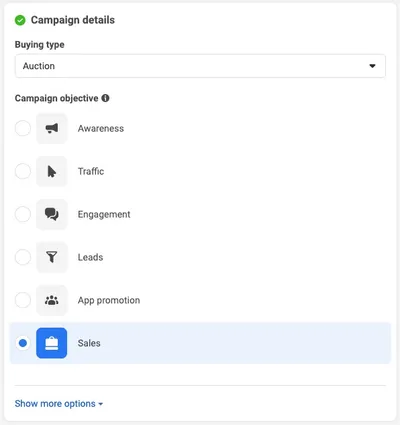
Choosing the right Facebook ad objective can feel complex, even for experienced marketers. With Facebook’s recent consolidation of objectives into six streamlined options, understanding each is essential to running effective campaigns. In this post, we’ll demystify Facebook ad objectives, helping you determine which aligns best with your goals in 2024. Whether you’re aiming to increase awareness, generate leads, or drive sales, this guide will help you make informed, strategic choices.
Facebook ad objectives are essentially the “goals” you set when launching a campaign, guiding Facebook’s algorithms to deliver results aligned with those goals. Choosing an objective tells Facebook how you define success, whether it’s measured by visits, engagement, or conversions.
However, understanding these objectives goes beyond a simple choice. Many objectives function differently depending on your ad’s setup and the data Facebook collects. For example, objectives that rely on pixel data to track specific actions (like conversions) need enough event data to optimize effectively. Choosing the right objective is about aligning Facebook’s optimization capabilities with your business goals.

In 2024, Facebook offers six primary ad objectives to choose from.
Each objective aligns with specific marketing goals and will impact how Facebook targets your audience. Selecting the wrong objective can lead to wasted budget, so understanding each one’s unique purpose is crucial.
Here’s a breakdown of the six ad objectives, along with how Facebook optimizes each type:
| Objective | How It's Optimized |
|---|---|
| Awareness | Optimized for maximum reach and ad recall. |
| Traffic | Optimized to prioritize people likely to go to the destination promoted in your ad. |
| Engagement | Optimized to prioritize people likely to engage with ads and pages on Facebook. |
| Leads | Optimized to prioritize people likely to provide their contact information. |
| App promotion | Optimized based on app activities such as installs or in-app purchases. |
| Purchase | Optimized for specific events like purchases, add to cart, or custom conversions. |
The Awareness objective is focused on reaching as many people as possible while prioritizing those who are likely to remember your brand within a short time frame. Facebook’s “ad recall lift” measures how likely users are to recall your brand in the two days following exposure.
Best for: New brands or companies launching a product and looking to build recognition.
Pro Tip: Awareness campaigns are a great first step for generating interest and building retargeting audiences.
Facebook optimizes for users likely to click on your link and visit your chosen destination, such as a website or app.
Best for: Established audiences or retargeting warm leads.
Pro Tip: Be cautious with broad targeting; traffic ads may attract low-quality clicks. Use pixel data to refine targeting.
The Engagement objective is designed to prioritize people likely to interact with your content on Facebook.
Best for: Posts where you want to build visibility and encourage likes, shares, or comments.
Pro Tip: Run engagement campaigns to boost social proof before switching to a Sales objective using the same post.
The Leads objective finds users likely to provide their contact information via lead forms, Messenger, or WhatsApp.
Best for: Businesses that rely on leads to drive sales (e.g., real estate, services, education).
Pro Tip: Use warm audiences for better performance. Retargeting works well here.
Helps drive app installs or in-app actions like purchases or registrations.
Best for: App developers or companies looking to boost installs or app usage.
Pro Tip: Ensure consistent in-app activity before using this objective to allow Facebook to optimize effectively.
Focused on driving conversions such as purchases or registrations. Uses Facebook pixel data for optimization.
Best for: Businesses with a proven sales funnel and adequate conversion data.
Pro Tip: Ensure at least 50 conversions/week for optimal performance. Start with Awareness or Traffic if you’re just beginning.
If you’re new to Facebook advertising, here’s a recommended approach:
Start by building brand recognition and identifying engaged users.
Retarget Stage 1 users to drive site visits and track events with the Facebook pixel.
Once you have enough data and conversions, use Lead or Sales objectives to optimize for valuable actions.
This 3-stage strategy aligns with a traditional marketing funnel.